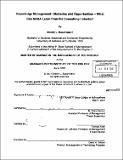Knowledge management : obstacles and opportunities-- what can NASA learn from the consulting industry?
Author(s)
Buschmann, Sherry L. (Sherry Lee), 1956-
DownloadFull printable version (7.380Mb)
Other Contributors
Massachusetts Institute of Technology. Management of Technology Program.
Advisor
M. Diane Burton.
Terms of use
Metadata
Show full item recordAbstract
Knowledge Management (KM) has become a strategic business practice that is credited with providing and sustaining a firm's competitive advantage. Organizations skilled at knowledge management evaluate their core processes, capture insights of their findings, combine their skills and experiences, innovate, and apply the newly refined ideas quickly. Herein lies the competitive advantage. Organizations that excel at maximizing corporate knowledge, such as consulting firms, tend to be the ones that 1) value their employees, 2) have a culture of learning, and 3) have processes for sharing information. This thesis focuses on the KM strategies of consulting firms. In consulting, knowledge is the very cornerstone of the services a firm offers its clients. An extensive literature review, combined with interviews of a crosssection of the consulting industry, provides insight into the KM systems and organizational culture of successful firms. The knowledge gained from this research will be used in the development and implementation of a KM system at the National Aeronautics and Space Agency (NASA.). NASA is facing the possibility of losing fifty percent of its civil service workforce through retirement over the next five years. Capturing and storing technical and institutional knowledge for future use will help to assure the success and continuity of the nation's space agency. Although several areas emerge from the research as being key to the success or a firm's KM system, one theme outweighs all others - organizational culture. Information technology alone is inadequate to perform the tasks of managing a firm's knowledge. The firm must create a learning and sharing culture where personal networks and information technology combine to create an environment that maximizes corporate knowledge. In this thesis, I outline a framework, with suggested diagnostic actions, to assist managers at NASA and other organizations in the assessment of different cultural aspects most likely to affect critical knowledge-related behaviors. Using this framework will allow for more informed decisions concerning the realignment of the firm's culture to effectively support the goals for leveraging organizational knowledge.
Description
Thesis (S.M.M.O.T.)--Massachusetts Institute of Technology, Sloan School of Management, Management of Technology Program, 2001. Includes bibliographical references (leaves 113-116).
Date issued
2001Department
Management of Technology Program.; Sloan School of ManagementPublisher
Massachusetts Institute of Technology
Keywords
Management of Technology Program.
